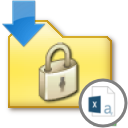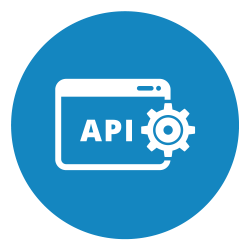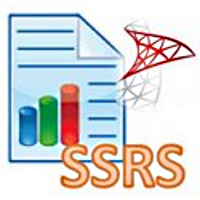ServiceNow Connector for SAP Crystal Reports
Allows the reading and writing of incidents, attachments, and more in ServiceNow without coding! The ZappySys ServiceNow API Connector provides easy-to-use, high-performance API access.
In this article you will learn how to quickly and efficiently integrate ServiceNow data in SAP Crystal Reports without coding. We will use high-performance ServiceNow Connector to easily connect to ServiceNow and then access the data inside SAP Crystal Reports.
Let's follow the steps below to see how we can accomplish that!
ServiceNow Connector for SAP Crystal Reports is based on ZappySys API Driver which is part of ODBC PowerPack. It is a collection of high-performance ODBC drivers that enable you to integrate data in SQL Server, SSIS, a programming language, or any other ODBC-compatible application. ODBC PowerPack supports various file formats, sources and destinations, including REST/SOAP API, SFTP/FTP, storage services, and plain files, to mention a few.
Create ODBC Data Source (DSN) based on ZappySys API Driver
Step-by-step instructions
To get data from ServiceNow using SAP Crystal Reports we first need to create a DSN (Data Source) which will access data from ServiceNow. We will later be able to read data using SAP Crystal Reports. Perform these steps:
-
Download and install ODBC PowerPack.
-
Open ODBC Data Sources (x64):
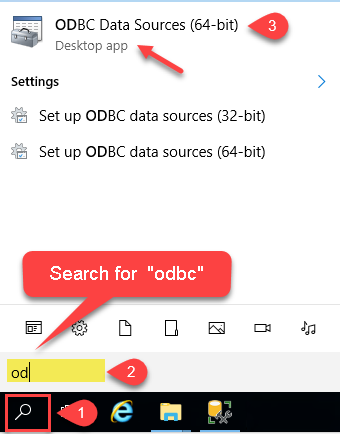
-
Create a User data source (User DSN) based on ZappySys API Driver:
ZappySys API Driver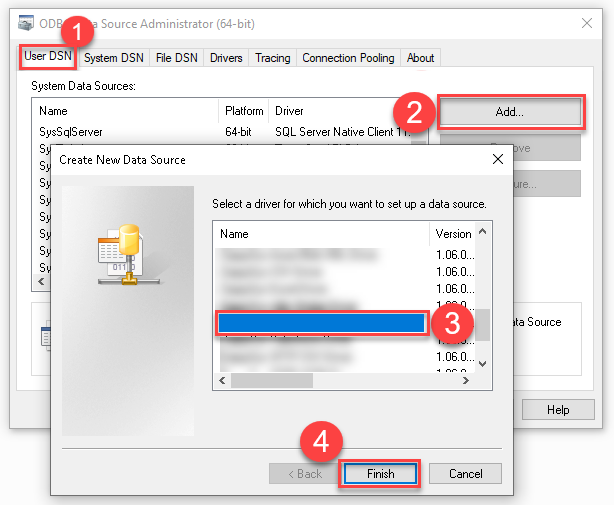
-
Create and use User DSN
if the client application is run under a User Account.
This is an ideal option
in design-time , when developing a solution, e.g. in Visual Studio 2019. Use it for both type of applications - 64-bit and 32-bit. -
Create and use System DSN
if the client application is launched under a System Account, e.g. as a Windows Service.
Usually, this is an ideal option to use
in a production environment . Use ODBC Data Source Administrator (32-bit), instead of 64-bit version, if Windows Service is a 32-bit application.
-
Create and use User DSN
if the client application is run under a User Account.
This is an ideal option
-
When the Configuration window appears give your data source a name if you haven't done that already, then select "ServiceNow" from the list of Popular Connectors. If "ServiceNow" is not present in the list, then click "Search Online" and download it. Then set the path to the location where you downloaded it. Finally, click Continue >> to proceed with configuring the DSN:
ServicenowDSNServiceNow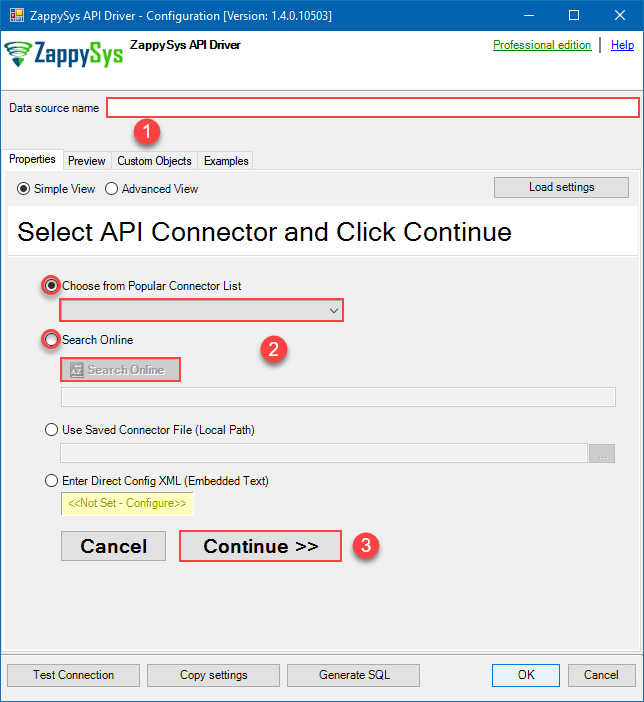
-
Now it's time to configure the Connection Manager. Select Authentication Type, e.g. Token Authentication. Then select API Base URL (in most cases, the default one is the right one). More info is available in the Authentication section.
ServiceNow authentication
Authenticate using ServiceNow instance username and password.
Locate your ServiceNow instance credentials and use them for HTTP authentication:
- Go to https://developer.servicenow.com/dev.do and log in.
- Click on your profile picture.
-
When a menu appears, click on Manage instance password or a similar option:
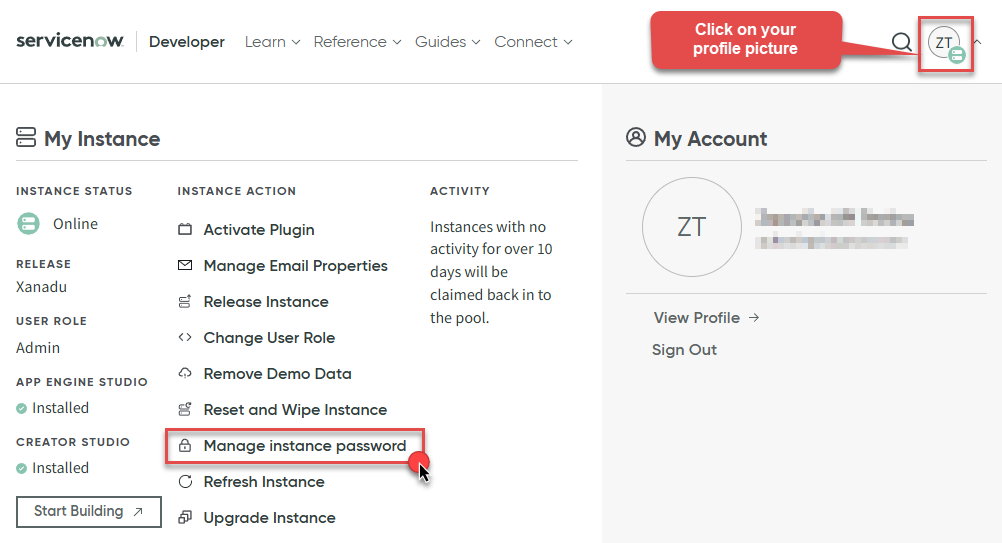
-
In a new window you will see your HTTP Basic Authentication credentials:
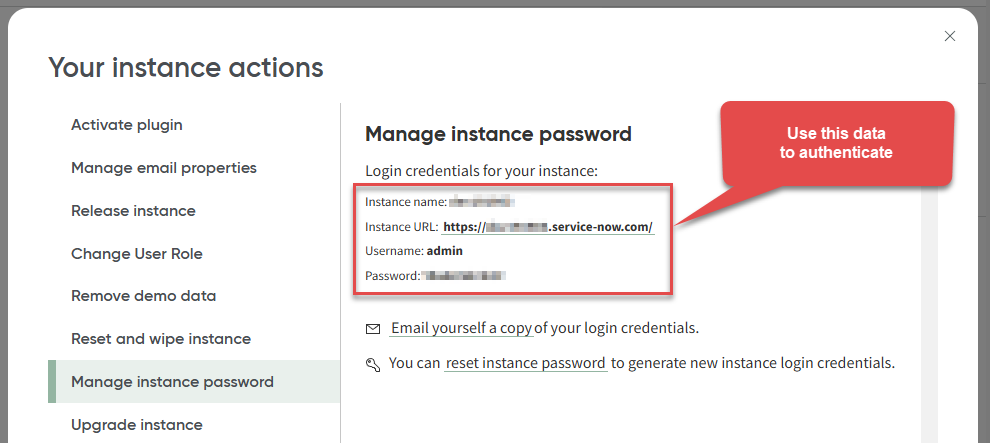
-
Done! Use this username and password when configuring OAuth Authentication parameters.
API Connection Manager configuration
Just perform these simple steps to finish authentication configuration:
-
Set Authentication Type to
Basic Auth [Http] - Optional step. Modify API Base URL if needed (in most cases default will work).
- Fill in all the required parameters and set optional parameters if needed.
- Finally, hit OK button:
ServicenowDSNServiceNowBasic Auth [Http]https://[$InstanceName$].service-now.com/api/nowRequired Parameters InstanceName Fill-in the parameter... User name Fill-in the parameter... Password Fill-in the parameter... Optional Parameters ApiVersion v2 RetryMode RetryWhenStatusCodeMatch RetryStatusCodeList 429 RetryCountMax 5 RetryMultiplyWaitTime True 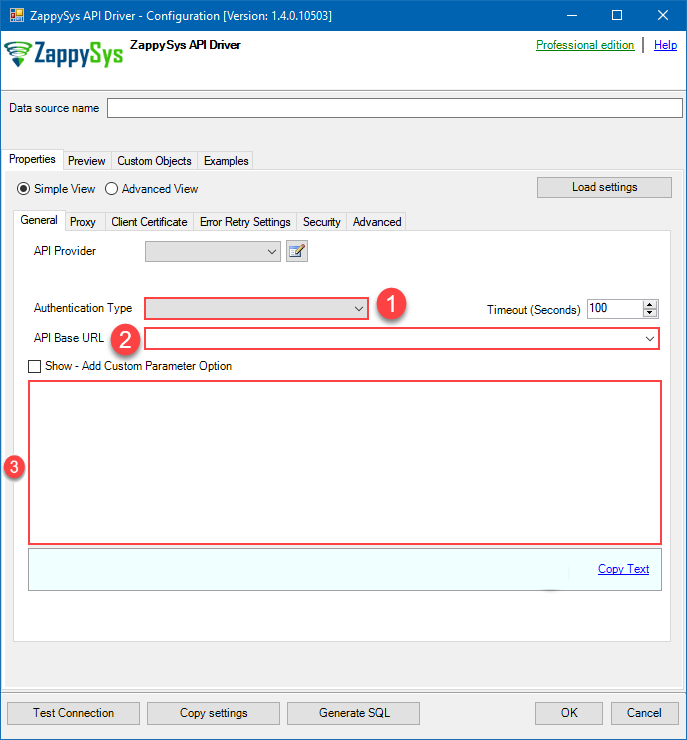
ServiceNow authentication
Authenticate using ServiceNow instance username, password, OAuth Client ID, and Client Secret. [API reference]
Create OAuth application and use it for authentication:
- Login to your instance at https://your-instance-id.service-now.com.
-
Start by clicking on menu item All, then search for oauth, and click Application Registry option:
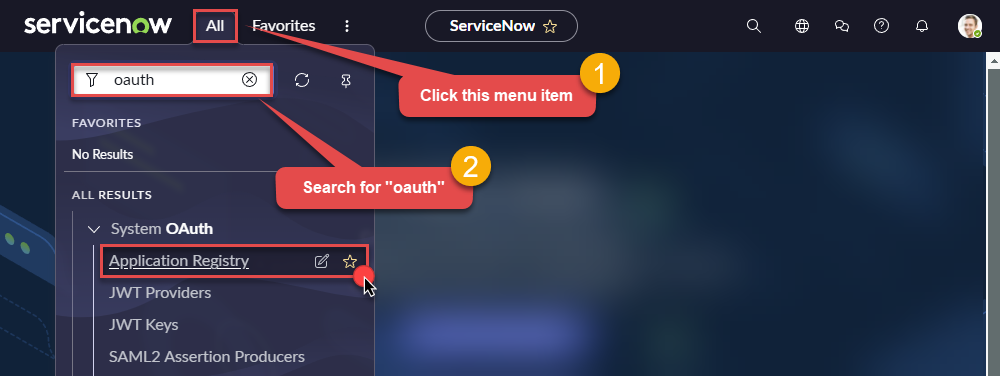
-
Then click button New:

-
Continue by clicking Create an OAuth API endpoint for external clients option:

-
Move on by naming your OAuth application and entering a Client Secret (or let it be generated automatically).
-
Finally give it a final touch by increasing the Refresh Token Lifespan value to
315,360,000(it should last for 10 years):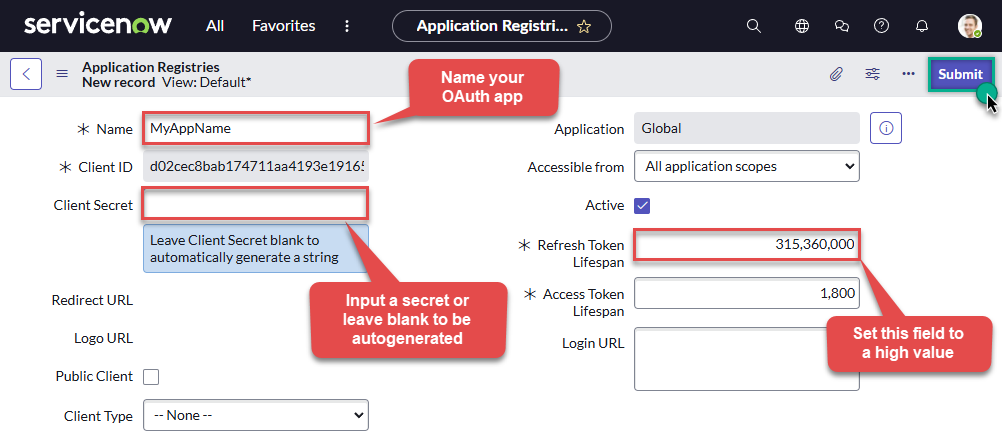
-
Done! Now you can use Client ID and Client Secret when configuring OAuth Authentication parameters.
API Connection Manager configuration
Just perform these simple steps to finish authentication configuration:
-
Set Authentication Type to
OAuth [OAuth] - Optional step. Modify API Base URL if needed (in most cases default will work).
- Fill in all the required parameters and set optional parameters if needed.
- Finally, hit OK button:
ServicenowDSNServiceNowOAuth [OAuth]https://[$InstanceName$].service-now.com/api/nowRequired Parameters InstanceName Fill-in the parameter... User name Fill-in the parameter... Password Fill-in the parameter... Client ID Fill-in the parameter... Client Secret Fill-in the parameter... ApiVersion Fill-in the parameter... Optional Parameters RetryMode RetryWhenStatusCodeMatch RetryStatusCodeList 429|503 RetryCountMax 5 RetryMultiplyWaitTime True 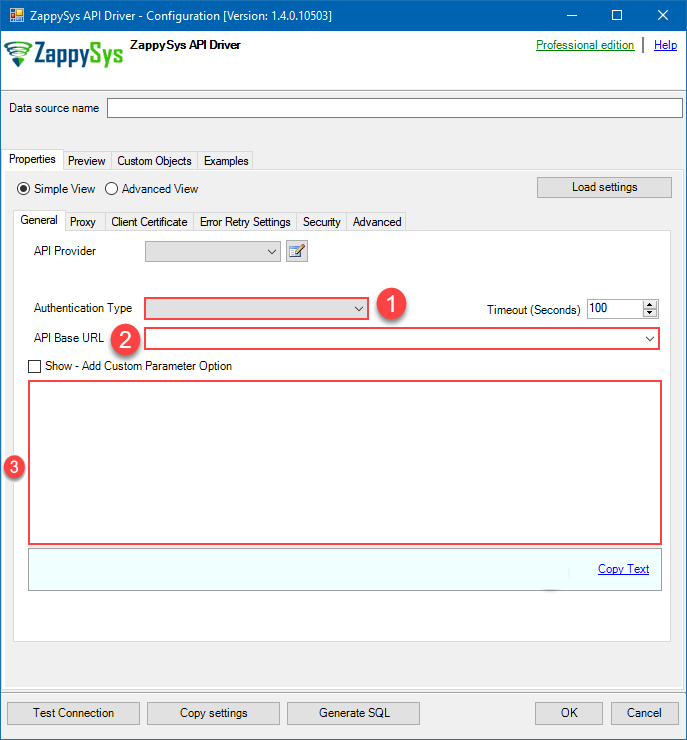
-
Once the data source connection has been configured, it's time to configure the SQL query. Select the Preview tab and then click Query Builder button to configure the SQL query:
 ZappySys API Driver - ServiceNowAllows the reading and writing of incidents, attachments, and more in ServiceNow without coding! The ZappySys ServiceNow API Connector provides easy-to-use, high-performance API access.ServicenowDSN
ZappySys API Driver - ServiceNowAllows the reading and writing of incidents, attachments, and more in ServiceNow without coding! The ZappySys ServiceNow API Connector provides easy-to-use, high-performance API access.ServicenowDSN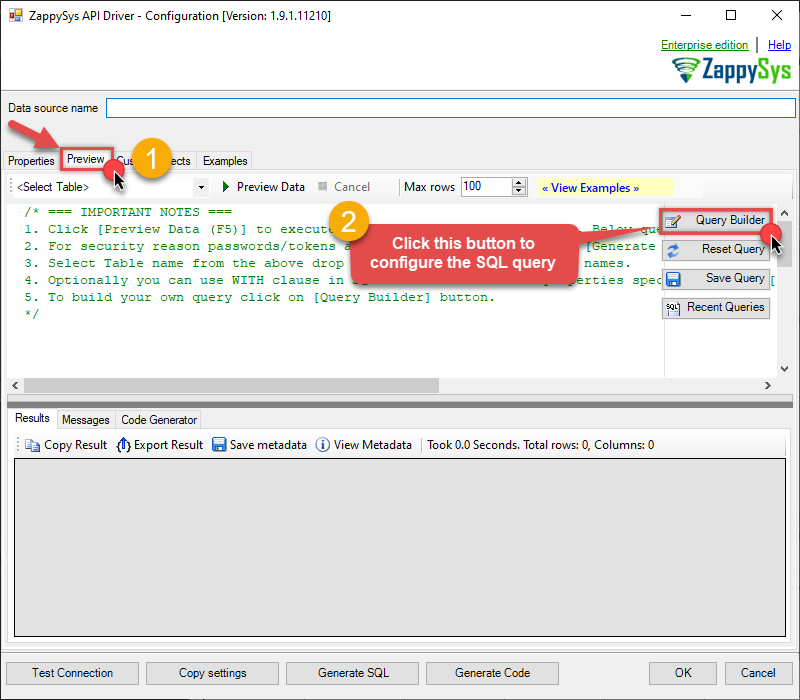
-
Start by selecting the Table or Endpoint you are interested in and then configure the parameters. This will generate a query that we will use in SAP Crystal Reports to retrieve data from ServiceNow. Hit OK button to use this query in the next step.
SELECT * FROM incident --Using Primary Key --SELECT * FROM any_table_here WHERE sys_id='109562a3c611227500a7b7ff98cc0dc7' --Primary Key in WHERE clause --Using Filter Expression --SELECT * FROM incident WITH(Query='number=INC0000001') --Equal condition --SELECT * FROM incident WITH(Query='number!=INC0000001') --Not equal condition --SELECT * FROM incident WITH(Query='numberININC0000001,INC0000002,INC0000003') --IN condition --SELECT * FROM incident WITH(Query='number=INC0000001^state=7') --AND condition --SELECT * FROM incident WITH(Query='number=INC0000001^ORnumber=INC0000002') --OR condition --SELECT * FROM incident WITH(Query='numberLIKE0001') --LIKE condition --SELECT * FROM incident WITH(Query='numberSTARTSWITHINC00') --StartWith condition --SELECT * FROM incident WITH(Query='numberENDSWITH0001') --StartWith condition --SELECT * FROM incident WITH(Query='number=INC0000001^state=7^NQORnumber=INC0000002') --AND / OR MIXED using NQ (NewQuery Operator) -- (number=INC0000001 and state=7) OR (number=INC0000002) --more information about filter here https://docs.servicenow.com/bundle/utah-platform-user-interface/page/use/common-ui-elements/reference/r_OpAvailableFiltersQueries.html -- To read all available tables execute this query: -- SELECT * FROM Tables -- Other common tables: ----------------------- -- SELECT * FROM sys_db_object -- SELECT * FROM sys_dictionary -- SELECT * FROM sys_user -- SELECT * FROM sys_user_has_role -- SELECT * FROM sys_user_grmember -- SELECT * FROM task -- SELECT * FROM task_sla -- SELECT * FROM incident -- SELECT * FROM incident_sla -- SELECT * FROM change_request -- SELECT * FROM cmdb_ci_computer -- SELECT * FROM cmdb_ci_outage -- SELECT * FROM cmdb_ci -- SELECT * FROM sn_customerservice_case -- SELECT * FROM kb_knowledge -- SELECT * FROM kb_use -- SELECT * FROM sc_req_item -- SELECT * FROM sc_request -- SELECT * FROM sc_task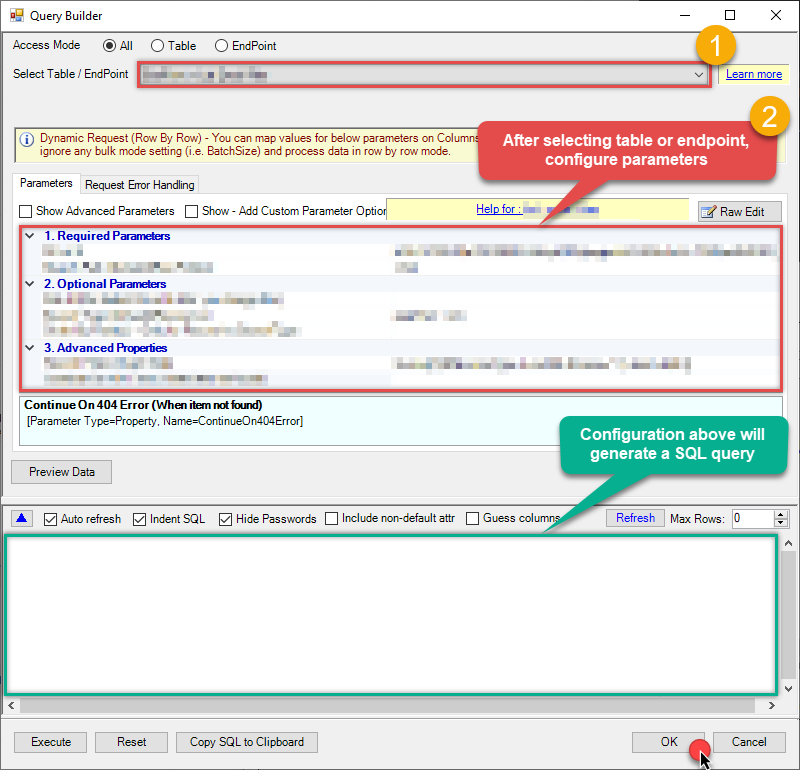 Some parameters configured in this window will be passed to the ServiceNow API, e.g. filtering parameters. It means that filtering will be done on the server side (instead of the client side), enabling you to get only the meaningful data
Some parameters configured in this window will be passed to the ServiceNow API, e.g. filtering parameters. It means that filtering will be done on the server side (instead of the client side), enabling you to get only the meaningful datamuch faster . -
Now hit Preview Data button to preview the data using the generated SQL query. If you are satisfied with the result, use this query in SAP Crystal Reports:
 ZappySys API Driver - ServiceNowAllows the reading and writing of incidents, attachments, and more in ServiceNow without coding! The ZappySys ServiceNow API Connector provides easy-to-use, high-performance API access.ServicenowDSN
ZappySys API Driver - ServiceNowAllows the reading and writing of incidents, attachments, and more in ServiceNow without coding! The ZappySys ServiceNow API Connector provides easy-to-use, high-performance API access.ServicenowDSNSELECT * FROM incident --Using Primary Key --SELECT * FROM any_table_here WHERE sys_id='109562a3c611227500a7b7ff98cc0dc7' --Primary Key in WHERE clause --Using Filter Expression --SELECT * FROM incident WITH(Query='number=INC0000001') --Equal condition --SELECT * FROM incident WITH(Query='number!=INC0000001') --Not equal condition --SELECT * FROM incident WITH(Query='numberININC0000001,INC0000002,INC0000003') --IN condition --SELECT * FROM incident WITH(Query='number=INC0000001^state=7') --AND condition --SELECT * FROM incident WITH(Query='number=INC0000001^ORnumber=INC0000002') --OR condition --SELECT * FROM incident WITH(Query='numberLIKE0001') --LIKE condition --SELECT * FROM incident WITH(Query='numberSTARTSWITHINC00') --StartWith condition --SELECT * FROM incident WITH(Query='numberENDSWITH0001') --StartWith condition --SELECT * FROM incident WITH(Query='number=INC0000001^state=7^NQORnumber=INC0000002') --AND / OR MIXED using NQ (NewQuery Operator) -- (number=INC0000001 and state=7) OR (number=INC0000002) --more information about filter here https://docs.servicenow.com/bundle/utah-platform-user-interface/page/use/common-ui-elements/reference/r_OpAvailableFiltersQueries.html -- To read all available tables execute this query: -- SELECT * FROM Tables -- Other common tables: ----------------------- -- SELECT * FROM sys_db_object -- SELECT * FROM sys_dictionary -- SELECT * FROM sys_user -- SELECT * FROM sys_user_has_role -- SELECT * FROM sys_user_grmember -- SELECT * FROM task -- SELECT * FROM task_sla -- SELECT * FROM incident -- SELECT * FROM incident_sla -- SELECT * FROM change_request -- SELECT * FROM cmdb_ci_computer -- SELECT * FROM cmdb_ci_outage -- SELECT * FROM cmdb_ci -- SELECT * FROM sn_customerservice_case -- SELECT * FROM kb_knowledge -- SELECT * FROM kb_use -- SELECT * FROM sc_req_item -- SELECT * FROM sc_request -- SELECT * FROM sc_task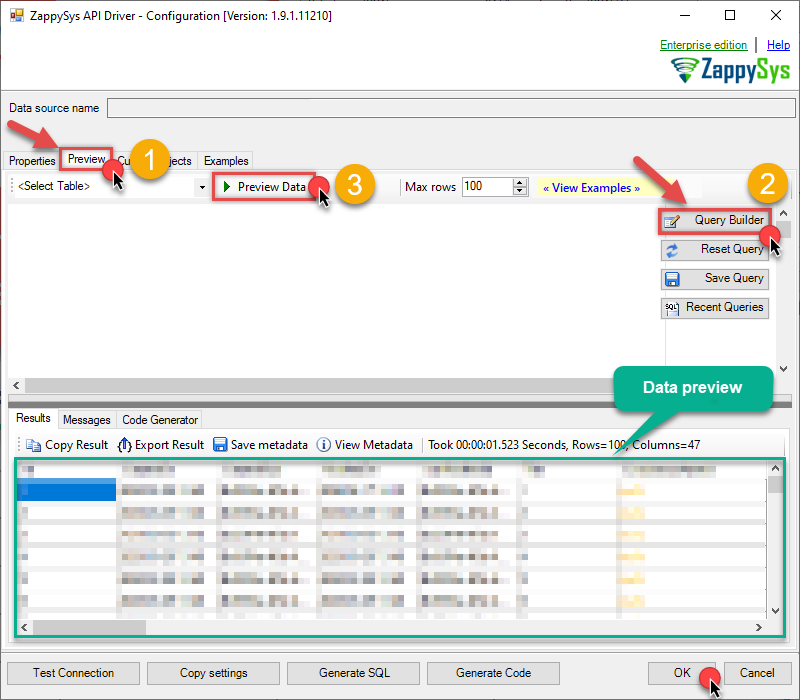 You can also access data quickly from the tables dropdown by selecting <Select table>.A
You can also access data quickly from the tables dropdown by selecting <Select table>.AWHEREclause,LIMITkeyword will be performed on the client side, meaning that thewhole result set will be retrieved from the ServiceNow API first, and only then the filtering will be applied to the data. If possible, it is recommended to use parameters in Query Builder to filter the data on the server side (in ServiceNow servers). -
Click OK to finish creating the data source.
Video Tutorial
Read data in SAP Crystal Reports from the ODBC data source
-
First of all, open SAP Crystal Reports and create the new Crystal Report.
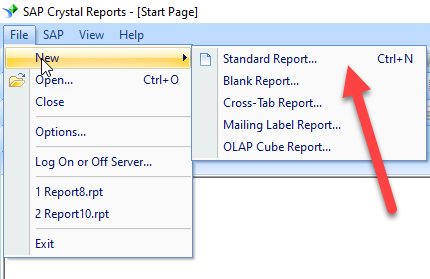
-
And it will open the new data source selection window. Under ODBC(RDO) double click on the Make New Connection and Select the desired ODBC DSN, in our case we need to select ServicenowDSN which we created in upper section. And Click on Next.
ServicenowDSN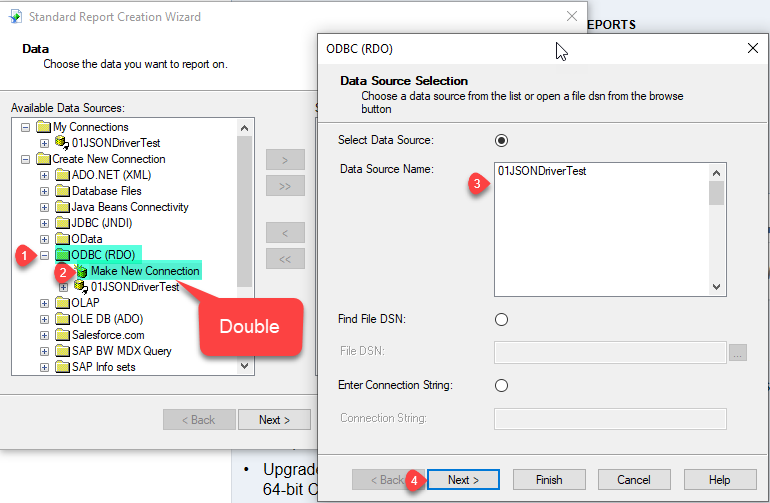
-
Expand the Connection and under the data select the desired table(s) or view(s) and click Add > button and click on Next.
ServicenowDSNServicenowDSN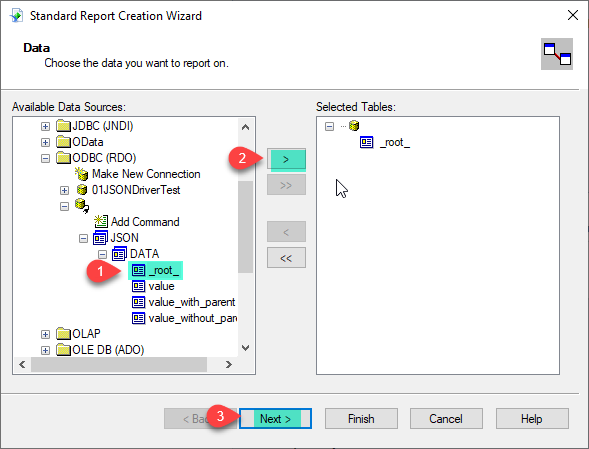
-
Add the desired Fields to Display in the Reports. Here we are adding all fields and click on Finish.
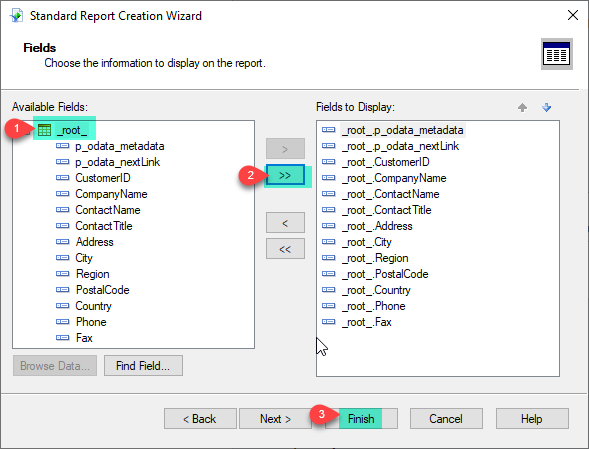
-
That's it and you will be able to load the data in the Report.
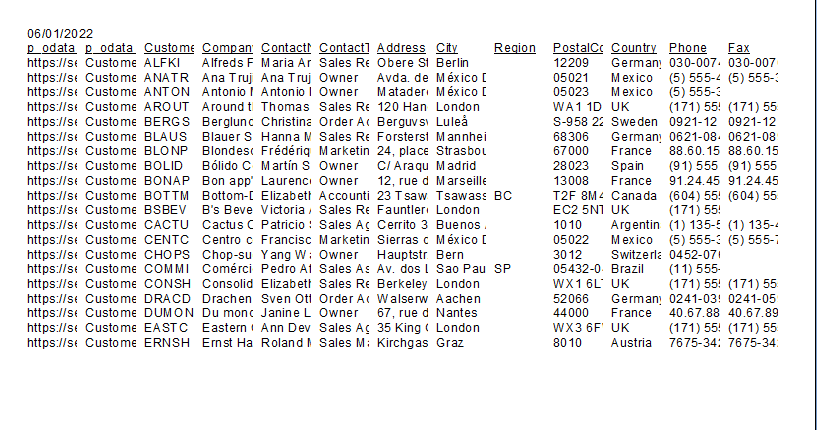
Using ZappySys Driver Custom Views and Stored Procedure in SAP Crystal Report
You can create parameterized Stored Procedure and Virtual Tables on the same Data Source (ODBC DSN or Data Gateway Data Source). Please refer to this article for the same. You can create procedures to encapsulate custom logic and then only pass handful parameters rather than long SQL to execute your API call.Using Custom Views in the SAP Crystal Report
After establishing the connection with ServicenowDSN Data Source you can use the custom view in SQL Crystal Report.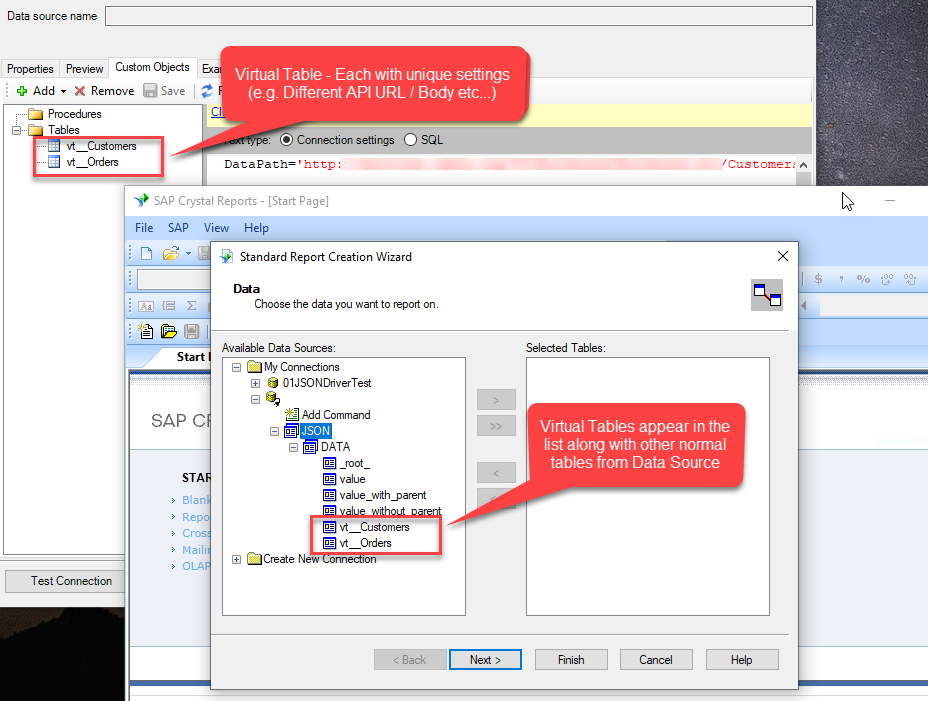
Using Custom Stored Procedure in the SAP Crystal Report
-
First of all, create the custom stored procedure in the ZappySys Driver. Please refer to this article to create the custom stored procedure.
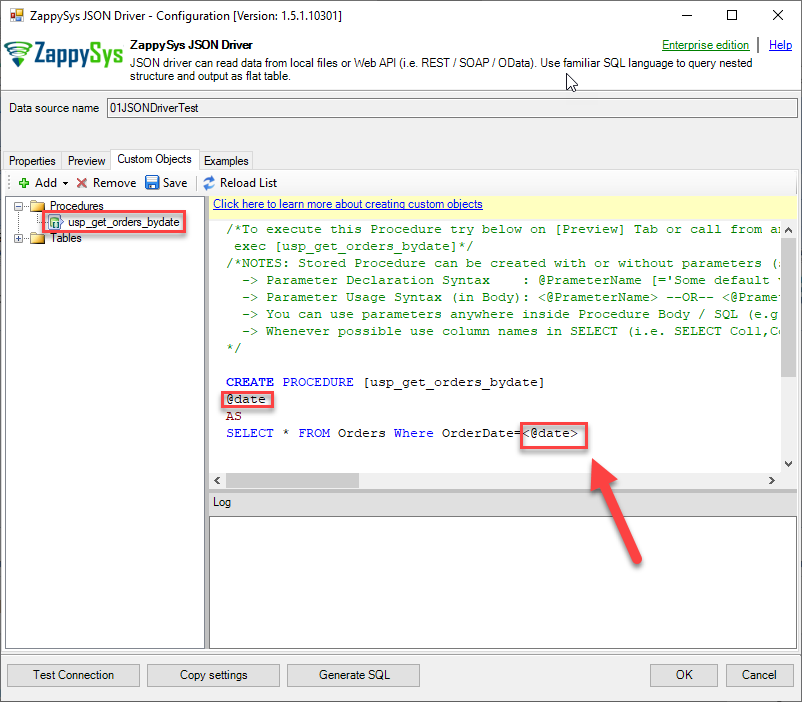
-
After establishing the connection with ServicenowDSN Data Source you can use the custom Stored Procedure in SQL Crystal Report. Same way you can write custom queries also in the query box.
ServicenowDSN
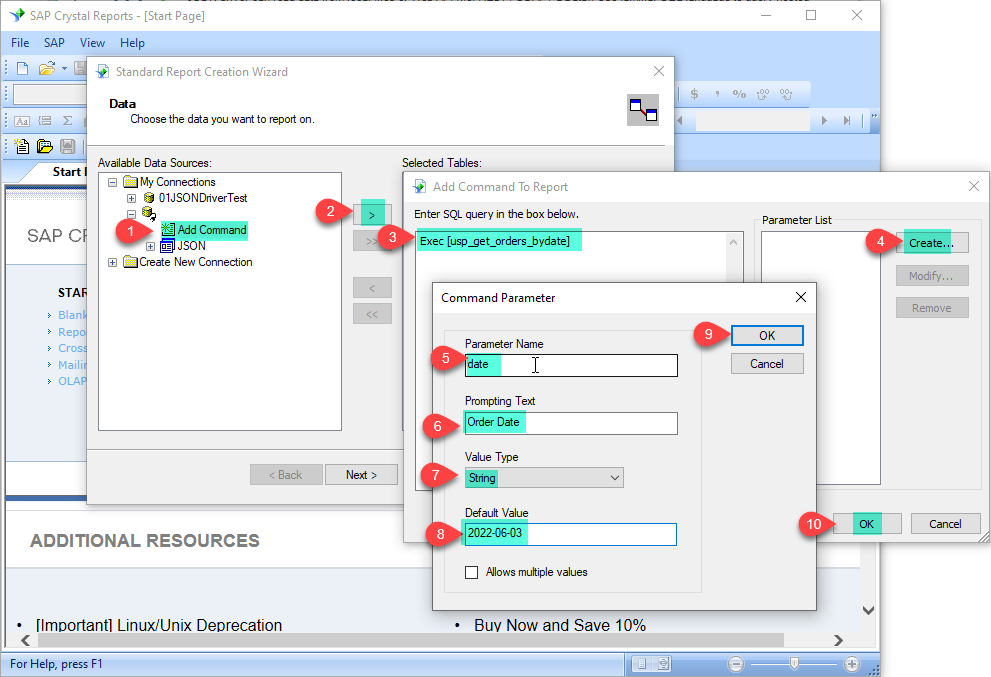
Centralized data access via Data Gateway
In some situations, you may need to provide ServiceNow data access to multiple users or services. Configuring the data source on a Data Gateway creates a single, centralized connection point for this purpose.
This configuration provides two primary advantages:
-
Centralized data access
The data source is configured once on the gateway, eliminating the need to set it up individually on each user's machine or application. This significantly simplifies the management process.
-
Centralized access control
Since all connections route through the gateway, access can be governed or revoked from a single location for all users.
| Data Gateway |
Local ODBC
data source
|
|
|---|---|---|
| Simple configuration | ||
| Installation | Single machine | Per machine |
| Connectivity | Local and remote | Local only |
| Connections limit | Limited by License | Unlimited |
| Central data access | ||
| Central access control | ||
| More flexible cost |
If you need any of these requirements, you will have to create a data source in Data Gateway to connect to ServiceNow, and to create an ODBC data source to connect to Data Gateway in SAP Crystal Reports.
Let's not wait and get going!
Creating ServiceNow data source in Gateway
In this section we will create a data source for ServiceNow in Data Gateway. Let's follow these steps to accomplish that:
-
Search for
gatewayin Windows Start Menu and open ZappySys Data Gateway Configuration: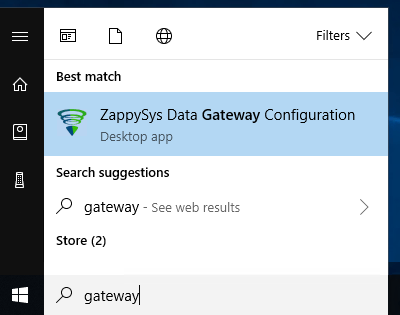
-
Go to Users tab and follow these steps to add a Data Gateway user:
- Click Add button
-
In Login field enter username, e.g.,
john - Then enter a Password
- Check Is Administrator checkbox
- Click OK to save
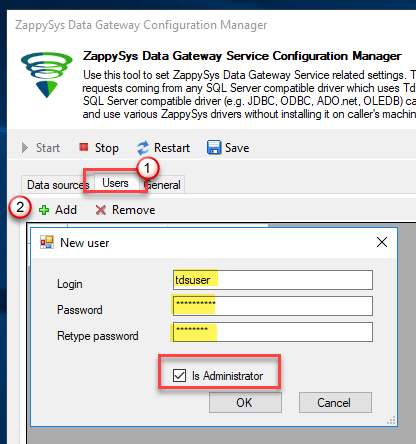
-
Now we are ready to add a data source:
- Click Add button
- Give Datasource a name (have it handy for later)
- Then select Native - ZappySys API Driver
- Finally, click OK
ServicenowDSNZappySys API Driver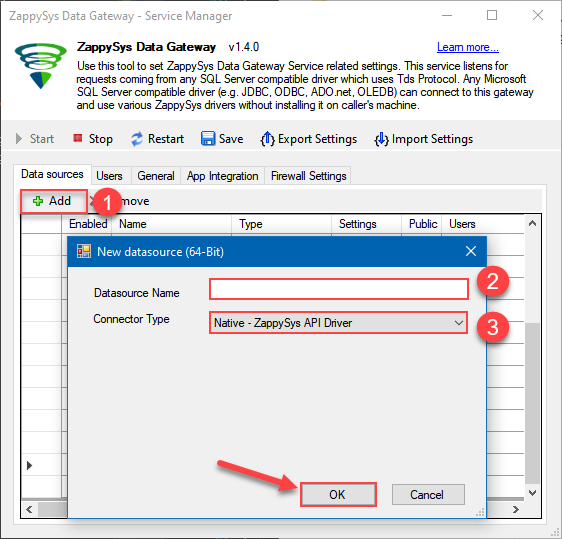
-
When the ZappySys API Driver configuration window opens, configure the Data Source the same way you configured it in ODBC Data Sources (64-bit), in the beginning of this article.
-
Very important step. Now, after creating or modifying the data source make sure you:
- Click the Save button to persist your changes.
- Hit Yes, once asked if you want to restart the Data Gateway service.
This will ensure all changes are properly applied:
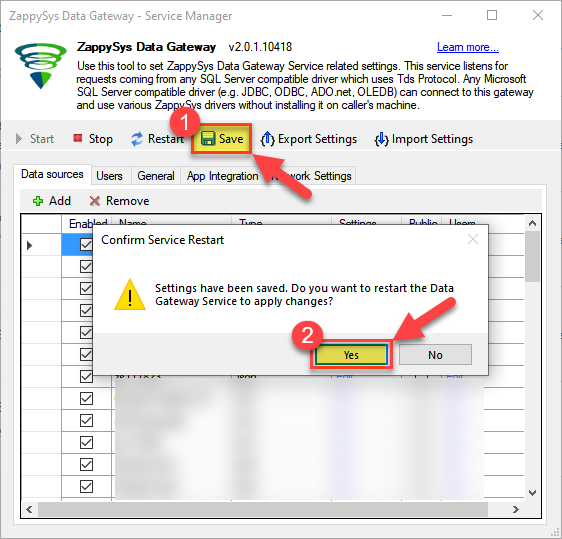 Skipping this step may result in the new settings not taking effect and, therefore you will not be able to connect to the data source.
Skipping this step may result in the new settings not taking effect and, therefore you will not be able to connect to the data source.
Creating ODBC data source for Data Gateway
In this part we will create ODBC data source to connect to Data Gateway from SAP Crystal Reports. To achieve that, let's perform these steps:
-
Open ODBC Data Sources (x64):

-
Create a User data source (User DSN) based on ODBC Driver 17 for SQL Server:
ODBC Driver 17 for SQL Server If you don't see ODBC Driver 17 for SQL Server driver in the list, choose a similar version driver.
If you don't see ODBC Driver 17 for SQL Server driver in the list, choose a similar version driver. -
Then set a Name of the data source (e.g.
Gateway) and the address of the Data Gateway:GatewayDSNlocalhost,5000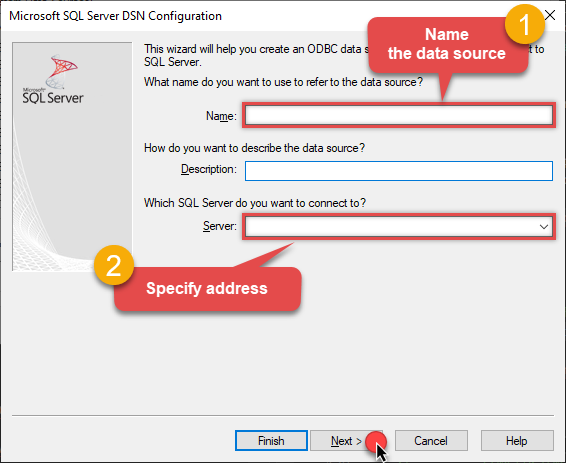 Make sure you separate the hostname and port with a comma, e.g.
Make sure you separate the hostname and port with a comma, e.g.localhost,5000. -
Proceed with authentication part:
- Select SQL Server authentication
-
In Login ID field enter the user name you used in Data Gateway, e.g.,
john - Set Password to the one you configured in Data Gateway
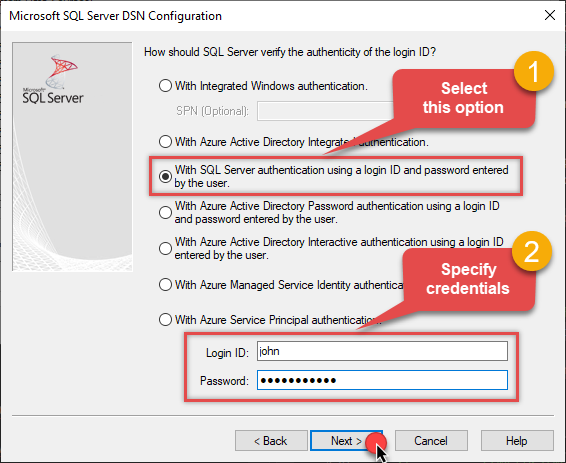
-
Then set the default database property to
ServicenowDSN(the one we used in Data Gateway):ServicenowDSN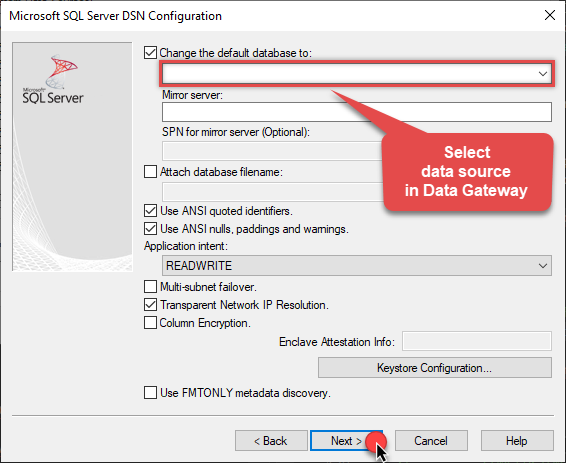
-
Continue by checking Trust server certificate option:
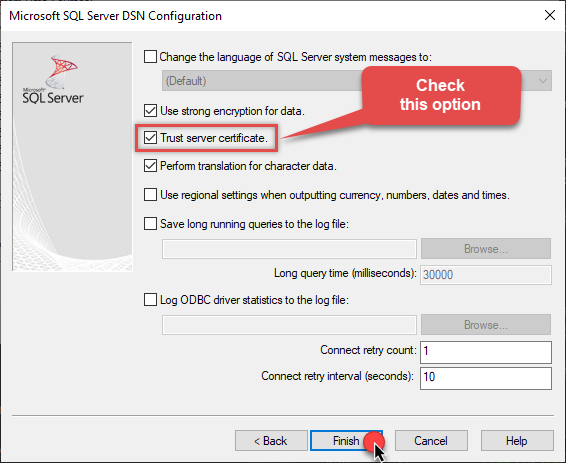
-
Once you do that, test the connection:
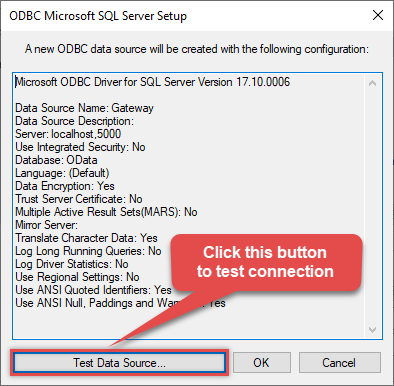
-
If connection is successful, everything is good:
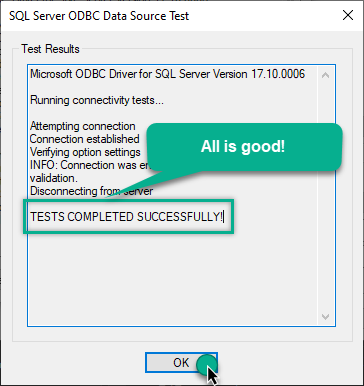
-
Done!
We are ready to move to the final step. Let's do it!
Accessing data in SAP Crystal Reports via Data Gateway
Finally, we are ready to read data from ServiceNow in SAP Crystal Reports via Data Gateway. Follow these final steps:
-
Go back to SAP Crystal Reports.
-
First of all, open SAP Crystal Reports and create the new Crystal Report.

-
And it will open the new data source selection window. Under ODBC(RDO) double click on the Make New Connection and Select the desired ODBC DSN, in our case we need to select GatewayDSN which we created in upper section. And Click on Next.
GatewayDSN
-
Read the data the same way we discussed at the beginning of this article.
-
That's it!
Now you can connect to ServiceNow data in SAP Crystal Reports via the Data Gateway.
john and your password.
Actions supported by ServiceNow Connector
Learn how to perform common ServiceNow actions directly in SAP Crystal Reports with these how-to guides:
- Delete a Table Row
- Delete table row
- Get List Of System Tables Admin Use Sys Db Object
- Get List of Tables
- Get List Of Tables Admin Use Sys Db Object
- Get List Of User Tables Admin Use Sys Db Object
- Get Table Columns
- Get Table Columns Admin Use Sys Dictionary
- Get Table Rows
- Update a Table Row
- Make Generic API Request
- Make Generic API Request (Bulk Write)
Conclusion
In this article we showed you how to connect to ServiceNow in SAP Crystal Reports and integrate data without any coding, saving you time and effort.
We encourage you to download ServiceNow Connector for SAP Crystal Reports and see how easy it is to use it for yourself or your team.
If you have any questions, feel free to contact ZappySys support team. You can also open a live chat immediately by clicking on the chat icon below.
Download ServiceNow Connector for SAP Crystal Reports Documentation




























































